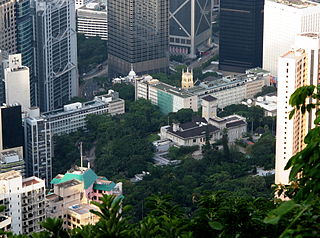
The Hong Kong Housing Authority is the main provider of public housing in Hong Kong. It was established in 1973 under the Housing Ordinance and is an agency of the Government of Hong Kong. In the same year, the Resettlement Department and the Building Section of the Urban Services Department were merged to form the Housing Department, which acts as the Housing Authority's executive body.

The Hong Kong Housing Society or Housing Society for short, is the second largest public housing provider in Hong Kong. The Society housed 147,346 residents as of 2012.
Housing Department (房屋署) is a department of Hong Kong Government, managing public housing estates that were built by Hong Kong Housing Authority in Hong Kong. It reports to the Housing, Planning and Lands Bureau, which is headed by the Secretary for Housing, Planning and Lands.
The Hong Kong Secretary for Housing, Planning and Lands was the head of the Housing, Planning and Lands Bureau, which was responsible for urban planning policy, public housing and the management and selling of public lands. The position was abolished in 2007 when the Housing, Planning and Lands Bureau was abolished.

The Former Central Government Offices, now is called the Justice Place (律政中心), is an office building complex that formerly housed most of the major offices of the Hong Kong Government. The complex is located in Central, Hong Kong, occupying the lower level of Government Hill. The offices of the government have been relocated to the Main Block of the Central Government Complex, Tamar.

The Government Secretariat is collectively formed by the Offices of the Chief Secretary and the Financial Secretary and thirteen policy bureaux.

The Transport Department of the Government of Hong Kong is a department of the civil service responsible for transportation-related policy in Hong Kong. The department is under the Transport and Housing Bureau.
Leung Chin-man JP is a retired senior civil servant in the Government of Hong Kong the former Permanent Secretary for Housing, Planning and Lands.

Rita Lau Ng Wai-lan is a Hong Kong former civil servant. She was appointed Secretary for Commerce and Economic Development in July 2008 after her predecessor Frederick Ma resigned due to health reasons. Coincidentally, ill-health also forced her resignation from this position on 8 April 2011, following an operation to remove a colon tumour.

The Secretary for Development of the Hong Kong Government is responsible for planning, land development and public works related development policy in Hong Kong. The position was created in 2007 to replace portions of the previous portfolios of Secretary for the Environment, Transport and Works and Secretary for Housing, Planning and Lands.
The Small House Policy (SHP) was introduced in 1972 in Hong Kong. The objective was to improve the then prevailing low standard of housing in the rural areas of the New Territories. The Policy allows an indigenous male villager who is 18 years old and is descended through the male line from a resident in 1898 of a recognized village in the New Territories, an entitlement to one concessionary grant during his lifetime to build one house.
My Home Purchase Plan is one of the public housing initiatives of Hong Kong. This plan enables eligible citizens to purchase homes by way of "rent-and-buy". The Plan aims to provide assistance to potential sandwich class home buyers who are able to repay mortgages in the long term but currently do not have enough savings for the down payment. This plan is introduced by the Chief Executive of Hong Kong in the Policy address of Hong Kong 2010. The implementation of plan, that is the first 5000 flats under the plan is expected to be ready for sell in 2014.

The Hong Kong government started developing "New Towns" in the 1950s, in order to accommodate Hong Kong's booming population. At the first phase of development, the newly developed towns were called "satellite town", a concept borrowed from the United Kingdom, of which Hong Kong was then still a colony. Kwun Tong, located at eastern Kowloon, and Tsuen Wan, located at the south-west New Territories, were designated as the first two satellite towns, when the urban area in Hong Kong was still relatively small, restricted to the central and western part of Kowloon Peninsula and the northern side of Hong Kong Island. Wah Fu Estate was also built in a remote corner at the southern side of Hong Kong Island, with similar concepts in a smaller scale.
Patrick Lau Lai-chiu (劉勵超), born 1950/51, JP, SBS is a former career civil servant in the Hong Kong Government. He retired in 2007 as Director of Lands, head of the Lands Department.

Public factory estates are blocks of factory buildings owned by the Government of Hong Kong. Built between the late 1950s and the early 1980s, most of these industrial buildings have been demolished during the 1990s and 2000s, while some have been converted and a few are still active. While these buildings are notable as witnesses of the history of manufacturing in Hong Kong and of the public housing policy of the Government of Hong Kong, they represent only a fraction of the industrial buildings of the territory: there were about 1,700 industrial buildings in Hong Kong in 2003.
The Hong Kong Secretary for Broadcasting, Culture and Sport was the head of the Broadcasting, Culture and Sport Bureau who was responsible for managing Hong Kong's broadcasting services, developing the film and public entertainment industries, promoting Hong Kong's Arts and Culture, and providing support to sports and physical recreation facilities. This position was set up on 1 July 1997 due to the transfer of sovereignty of Hong Kong, and it was abolished in April 1999 when the Housing, Planning and Lands Bureau was abolished.












